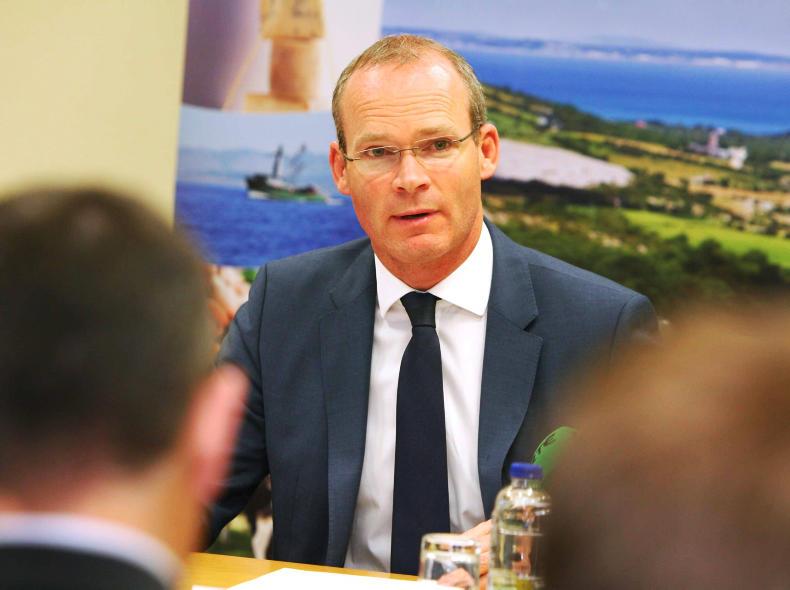Simon Coveney has been steeped in politics all his life, supporting his father Hugh and then, following his untimely death, succeeding him as a TD for Cork South Central at the tender age of 26.
Now he pursues the leadership of Fine Gael. He starts by laying out his view of politics in Ireland today.
“We live in a pretty divided society. Our politics is very splintered. We’ve been through a decade of real sacrifices and challenges and pressures on people and their families.
“What Government and Fine Gael need to provide now is a unifying message that gives hope to people.
“In many ways, the hard work has been done in the context of crisis management – from 16% unemployment to 6%, from 70,000 young people leaving annually to find work to 10,000 now coming home each year.
“This is a natural change point for the country. I’m in Fine Gael because I believe we are the party with the capacity to put a vision of the future of the country together.
“Running a government requires patience, experience, and the ability to build relationships with colleagues. I believe I have the capacity to do that as a party leader and as Taoiseach.”
Coveney’s star rose when appointed as Minister for Agriculture in 2011. It gave him a perspective on rural Ireland, one he carried into his current job where he is responsible for spatial strategy.
We need to rebalance this country – it is too dominated by Dublin in terms of economic and population growth
“As Minister for Agriculture, I think I’ve been in every parish in the country. Some of them are thriving, some are not.
“We need to rebalance this country – it is too dominated by Dublin in terms of economic and population growth. We need to invest heavily in infrastructure, setting ambitious targets. Every city outside Dublin needs to, in my view, double in size and provide hubs of activity and economic growth in the regions, which would be good for all rural Ireland.”
Brexit
Brexit is the dominant political issue right now. Coveney believes there are strong parallels and the similarities with CAP reform.
“The CAP discussions were demanding, but there was opportunity there. We boxed off a lot of the threats early on. That required me and Ireland to take a pretty strong and stubborn stance at times – in refusing to accept the direction the commission wanted CAP to go in. We won that argument.
“We’re facing a situation not of our own making: Britain is leaving the EU. This will require the building of alliances, educating and informing other countries as to why Ireland is especially vulnerable, and the scale of the necessary response.
There have to be some red-line issues for Ireland on Brexit. We cannot allow a hard border
“To be fair, Enda Kenny has done a really good job so far in that regard. The question now is whether we can deliver to minimise the effects of Brexit. The way to do that is not by banging the table or kicking the desk, it’s to build relationships, across Europe and in Britain, to make sure we don’t have a hard border on this island. There have to be some red-line issues for Ireland on Brexit. We cannot allow a hard border.”
Coveney has proven himself an able administrator, efficient and thorough. But leading a country requires more than competence, it needs leadership and some vision. What are Simon Coveney’s core beliefs?
“Politics should be a force for positive change, for investment in the right areas, for equality of opportunity. It should be both about helping those people who are vulnerable and need the State’s intervention, and also celebrating the success of those who are doing really well. That is something I feel we have lost in Ireland outside of sport. Fine Gael found a way to build a strong economy from what was a broken one, and now we need to build a strong society.
Work has always got to pay
“We need an agreed goal, a coherent plan, and a roadmap on how to get there. That’s the kind of thinking I’ve provided, whether that’s in agriculture, with Food Wise 2025. I did the same in defence, with the new white paper. I’ve now done the same in housing, where we have committed nearly €5.5bn for a new and different type of social housing. We have had a very successful action plan for jobs, creating over 200,000 jobs.”
“Work has always got to pay. I’ll never be an advocate for dependency culture, talking about rights for everything, and the need to get it for nothing, and that somebody else somewhere must pay for it through their taxes.”
Flexible
“What I’ve tried to do in housing is the opposite of that – mixed tenure communities where social and private housing are next door to each other, moving away from rent allowance to housing assistance payments, which is a much more flexible system that allows people to work and earn a lot more and still have state support in terms of housing.
“If you look at what I did with the CAP, for the first time we re-distributed €100m of payments to lower income farmers. I’m the first minister to do anything in that regard because I believe we need to support smaller and lower income farmers. We specifically singled out farmers on the islands for special support. My track record is of reaching out to people who are more vulnerable.”
The Dealer: much still to play for in Fine Gael leadership contest






 This is a subscriber-only article
This is a subscriber-only article










SHARING OPTIONS: